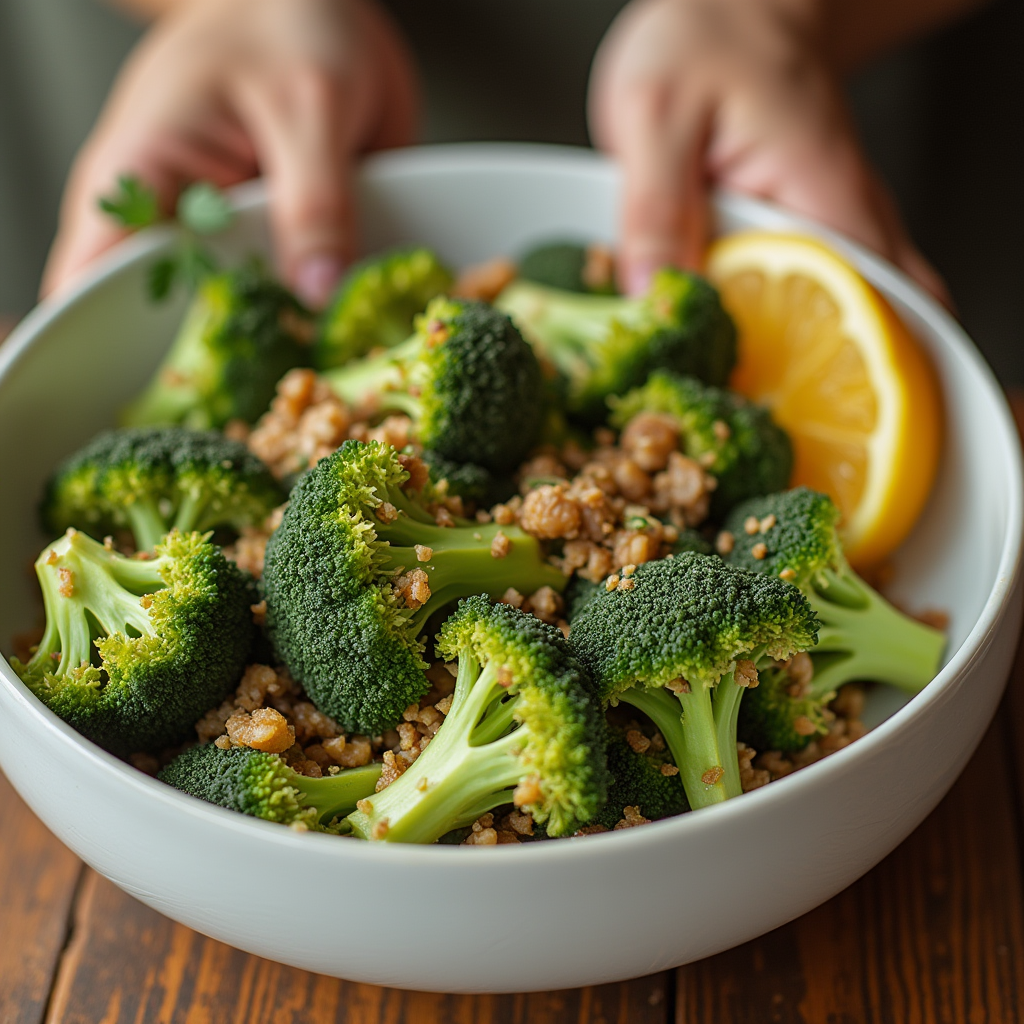“Benefits of Broccoli: Unlock Incredible Health Benefits with This Nutrient-Packed Superfood!”
Benefits of Broccoli: Why This Nutrient-Packed Superfood is Essential for Your Health
Broccoli has gained popularity as a go-to vegetable in healthy diets worldwide. Rich in vitamins, minerals, and powerful antioxidants, broccoli provides multiple health benefits, from supporting the immune system to improving skin health. In this article, we’ll explore the nutritional benefits of broccoli and break down how it supports various body systems. Let’s dive into why adding more broccoli to your diet can be transformative for your health.
1. Nutritional Benefits of Broccoli
Broccoli is a powerhouse of essential nutrients. A single serving of this vegetable contains significant amounts of vitamins C, K, and A, as well as fiber, folate, iron, potassium, and magnesium. Additionally, broccoli offers antioxidants like sulforaphane and quercetin, known for their ability to combat free radicals and reduce inflammation in the body.
- Vitamin C: A potent antioxidant, essential for immune function, collagen production, and skin health.
- Fiber: Supports digestive health and maintains healthy cholesterol levels.
- Vitamin K: Important for blood clotting and bone health.
- Folate: Essential for cell growth and proper DNA formation, especially beneficial during pregnancy.
Broccoli’s nutrient profile makes it a versatile vegetable that can fit well into any diet, supporting overall health and wellness.
2. Broccoli for Immune System Support
Broccoli is particularly known for its immune-boosting properties, largely due to its high vitamin C content. Vitamin C plays a crucial role in enhancing immune defenses by supporting the production and function of white blood cells. Additionally, broccoli contains beta-carotene, which the body converts into vitamin A, another key vitamin for immune health.
The high levels of antioxidants in broccoli, such as sulforaphane and quercetin, also contribute to immune resilience by reducing inflammation and protecting cells from oxidative damage. Eating broccoli regularly may help the body combat common infections and reduce inflammation, benefiting long-term immune function.

3. Why is Broccoli Good for Digestion?
If you’re looking to improve digestive health, broccoli is one of the best vegetables to include in your diet. Its high fiber content aids in maintaining regular bowel movements and promoting a healthy gut microbiome. Dietary fiber is essential for digestion as it adds bulk to the stool, preventing constipation and promoting smooth digestion.
In addition to fiber, broccoli contains a unique compound called glucoraphanin, which is converted into sulforaphane in the body. Studies have shown that sulforaphane may reduce gut inflammation and aid in preventing bacterial overgrowth, further supporting digestive health.
Broccoli also has a high water content, which, along with fiber, ensures that digestion is smooth and nutrient absorption is optimized. Regular consumption of broccoli not only supports a healthy digestive tract but can also help reduce the risk of digestive disorders.
4. Broccoli Benefits for Skin Health
Your skin can greatly benefit from adding broccoli to your diet. Broccoli is loaded with antioxidants and vitamins that help protect skin cells and keep your skin looking healthy and youthful. Vitamins C and E, both found in abundance in broccoli, are essential for skin health.
- Vitamin C: Known for its role in collagen synthesis, it helps maintain skin elasticity and reduce signs of aging like fine lines and wrinkles.
- Sulforaphane: This antioxidant compound in broccoli provides skin-protective benefits by shielding it from UV damage and reducing inflammation.
- Vitamin A: Supports skin repair and can be beneficial for conditions like acne or eczema.
Broccoli also supports skin health by providing a good dose of zinc, which helps regulate oil production and supports skin repair. Including broccoli in your diet may improve skin texture, hydration, and radiance.
5. Broccoli’s Role in Disease Prevention
Broccoli has been extensively studied for its role in preventing various chronic diseases due to its rich array of nutrients and antioxidants.
- Anti-Cancer Properties: The sulforaphane in broccoli is linked to a lower risk of certain cancers, including lung, colon, and breast cancers. It works by neutralizing carcinogens and inhibiting cancer cell growth.
- Diabetes Management: Broccoli’s low glycemic index and high fiber make it an excellent choice for blood sugar management. Sulforaphane has been shown to improve insulin sensitivity, which may benefit people with type 2 diabetes.
- Eye Health: Broccoli contains lutein and zeaxanthin, antioxidants known to reduce the risk of age-related macular degeneration and cataracts, thereby protecting eyesight.
By adding broccoli to your diet regularly, you may lower your risk of these diseases, supporting a longer, healthier life.
6. Comparing Broccoli to Other Vegetables
Broccoli often gets compared to other leafy green vegetables like kale, spinach, and cauliflower. While all of these are nutrient-dense and beneficial, broccoli stands out for its unique combination of fiber, antioxidants, and phytochemicals.
- Broccoli vs. Kale: Kale is high in vitamins A, C, and K, much like broccoli, but lacks significant amounts of sulforaphane.
- Broccoli vs. Cauliflower: Both belong to the cruciferous vegetable family, but broccoli has a higher fiber content and is richer in antioxidants.
- Broccoli vs. Spinach: Spinach is higher in iron and folate, but broccoli offers more vitamin C and has compounds like sulforaphane that spinach lacks.
Each of these vegetables has unique benefits, but broccoli provides a well-rounded nutritional profile that supports multiple body systems.
7. Best Ways to Include Broccoli in Your Diet
Broccoli is a versatile vegetable that can be enjoyed in various forms. Whether raw or cooked, broccoli retains most of its nutrients, though cooking methods can affect its vitamin C levels. Here are some ways to incorporate it:
- Steamed: Lightly steaming broccoli retains most of its nutrients while making it easier to digest.
- Roasted: Roasting adds flavor while keeping its nutrients intact. Try adding olive oil and spices for a delicious side dish.
- Raw in Salads: Add raw broccoli florets to salads for extra crunch and fiber.
- Smoothies: Blend broccoli with other vegetables and fruits for a nutrient-packed smoothie.
Including broccoli in your diet in these ways helps ensure that you’re getting all of its nutritional benefits in a tasty and enjoyable form.

8. Broccoli in Weight Management
If you’re aiming to manage or lose weight, broccoli is an excellent choice. Low in calories but high in fiber, broccoli can help you feel full and satisfied, reducing the likelihood of overeating. Fiber also slows digestion, which helps stabilize blood sugar and prevents hunger spikes. As a low-calorie, nutrient-dense food, broccoli supports weight management without sacrificing nutrition.
In addition, the water content in broccoli contributes to hydration, which is also beneficial for weight control and overall health. Including broccoli in meals or snacks can help you maintain a balanced diet and support weight loss goals.
9. Environmental and Economic Benefits of Broccoli
In addition to its health benefits, broccoli has positive environmental and economic impacts. Broccoli requires less water and land to grow compared to many other crops, making it a sustainable choice. Economically, it is often more affordable than other superfoods, providing a cost-effective option for those looking to eat healthily on a budget.
10. FAQs on Broccoli and Health
- How much broccoli should you eat daily?
Consuming around 1 cup (90–100 grams) of broccoli per day provides a healthy dose of nutrients without overloading on fiber. - Are there any side effects?
While broccoli is generally safe, some people may experience gas or bloating due to its high fiber content. Eating it in moderation and cooking it lightly can help mitigate these effects.
One of broccoli’s biggest advantages is its nutrient content. It’s loaded with a wide array of vitamins, minerals, fiber and other bioactive compounds.
One cup (91 grams) of raw broccoli packs (1):
- Carbs: 6 grams
- Protein: 2.6 gram
- Fat: 0.3 grams
- Fiber: 2.4 grams
- Vitamin C: 135% of the RDI
- Vitamin A: 11% of the RDI
- Vitamin K: 116% of the RDI
- Vitamin B9 (Folate): 14% of the RDI
- Potassium: 8% of the RDI
- Phosphorus: 6% of the RDI
- Selenium: 3% of the RDI
Conclusion: Why Broccoli is a Must-Add Superfood
Broccoli is one of the most nutrient-dense and versatile vegetables you can include in your diet. From immune support and digestive health to skin benefits and disease prevention, its benefits are extensive. By adding a cup of broccoli to your meals regularly, you can improve your health and enjoy the numerous advantages this superfood has to offer.







